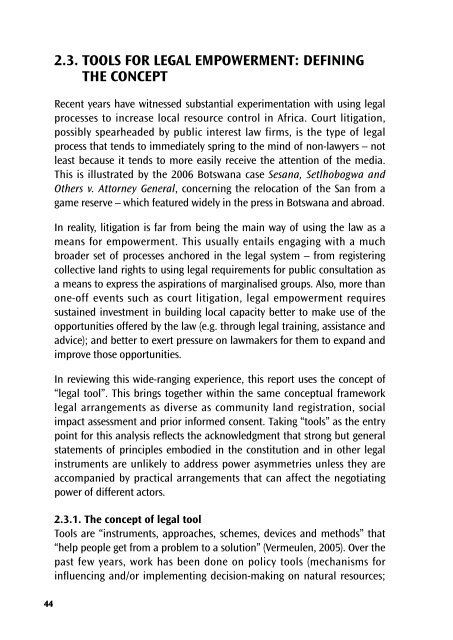Legal empowerment for local resource control
Legal empowerment for local resource control
Legal empowerment for local resource control
You also want an ePaper? Increase the reach of your titles
YUMPU automatically turns print PDFs into web optimized ePapers that Google loves.
44<br />
2.3. TOOLS FOR LEGAL EMPOWERMENT: DEFINING<br />
THE CONCEPT<br />
Recent years have witnessed substantial experimentation with using legal<br />
processes to increase <strong>local</strong> <strong>resource</strong> <strong>control</strong> in Africa. Court litigation,<br />
possibly spearheaded by public interest law firms, is the type of legal<br />
process that tends to immediately spring to the mind of non-lawyers – not<br />
least because it tends to more easily receive the attention of the media.<br />
This is illustrated by the 2006 Botswana case Sesana, Setlhobogwa and<br />
Others v. Attorney General, concerning the relocation of the San from a<br />
game reserve – which featured widely in the press in Botswana and abroad.<br />
In reality, litigation is far from being the main way of using the law as a<br />
means <strong>for</strong> <strong>empowerment</strong>. This usually entails engaging with a much<br />
broader set of processes anchored in the legal system – from registering<br />
collective land rights to using legal requirements <strong>for</strong> public consultation as<br />
a means to express the aspirations of marginalised groups. Also, more than<br />
one-off events such as court litigation, legal <strong>empowerment</strong> requires<br />
sustained investment in building <strong>local</strong> capacity better to make use of the<br />
opportunities offered by the law (e.g. through legal training, assistance and<br />
advice); and better to exert pressure on lawmakers <strong>for</strong> them to expand and<br />
improve those opportunities.<br />
In reviewing this wide-ranging experience, this report uses the concept of<br />
“legal tool”. This brings together within the same conceptual framework<br />
legal arrangements as diverse as community land registration, social<br />
impact assessment and prior in<strong>for</strong>med consent. Taking “tools” as the entry<br />
point <strong>for</strong> this analysis reflects the acknowledgment that strong but general<br />
statements of principles embodied in the constitution and in other legal<br />
instruments are unlikely to address power asymmetries unless they are<br />
accompanied by practical arrangements that can affect the negotiating<br />
power of different actors.<br />
2.3.1. The concept of legal tool<br />
Tools are “instruments, approaches, schemes, devices and methods” that<br />
“help people get from a problem to a solution” (Vermeulen, 2005). Over the<br />
past few years, work has been done on policy tools (mechanisms <strong>for</strong><br />
influencing and/or implementing decision-making on natural <strong>resource</strong>s;

















